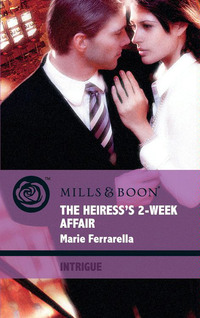
Полная версия
Diamond in the Rough
to recognize her when she walked into Bailey’s. How
will I know you?
Her answer was far from satisfying. Instead of a description, she gave him a cryptic reply. I’ll know you.
Miranda liked having the advantage on her side. Maybe it wasn’t polite, but at the moment, with the article still warm on her desk, she wasn’t feeling very polite. And this know-it-all didn’t deserve any cut slack.
Unless the photo on top of your column is an outdated one, she added.
It was a distinct possibility. A great many people in the arts used publicity photographs far more reminiscent of years gone by than of present day.
He answered her in less than a beat. Only by a year.
That meant he was good-looking, Miranda thought. Either that, or the photographer was deeply enamored of Photoshop. In either case, it didn’t matter. Giving the man a piece of her mind in person was most important. If people like him, bent on maintaining a grudge, didn’t exist, her father could receive the honor he richly deserved. He told her that it didn’t matter to him, but she knew better. How could something like that not matter?
Good, she typed. I’ll see you at six, she reiterated.
Maybe six-thirty would be a better time, Mike decided, typing the words the moment he reconsidered.
But it was too late. The woman on the other end of the dueling e-mail exchange was gone. His amended suggestion received no response and the sentence he’d typed sat as a solitary bottom line, lonely and unnoticed. The dialogue, such as it was, was over.
Mike studied the very brief correspondence, beginning with the woman’s opening e-mail to him about today’s column. This “Miranda” had to be old, he decided. His proof was that there were no one-letter shortcuts in any of the messages as had become the custom in quick messaging. It was a way of communication that personally irritated him. As a journalist, he’d always thought of the English language as an art form, something to be utilized rather than pared down. Most of the people he worked and socialized with didn’t feel the same. They were all in their twenties or early thirties.
This led him to the conclusion that the woman he had agreed to meet in person had to be some obsessed middle-aged—or older—harpy. She probably had a shrine in her bedroom devoted to Steven Orin Shaw, complete with a wall of photographs. Most likely she had it surrounded with candles.
Mike leaned back in his chair, knotting his fingers together behind his head as he mulled over the situation.
Maybe he wouldn’t show.
He did have an excuse. It was only Monday, but he did have to start getting ready to fill in for Ryan Wynters this weekend. The senior sportswriter had come down with the worst case of flu according to his editor, Howard Hilliard. Ryan was supposed to be covering the Super Bowl this Sunday. Since he was next in line, that meant that he was now covering the tradition-honored event. By all rights, he should be home, packing, not wasting his time sitting on a bar stool in a sports bar with some incensed female nut-job intent on a duel of words.
Whoever this Miranda was, he wasn’t going to convince her and she wasn’t going to convince him. What was the point of going?
He frowned.
The point of going was that he’d said he would. And he always kept his word.
Mike sighed.
Lance Matthews, the theater critic who sat opposite him, looked up. His gaunt, elongated face was devoid of any sort of telltale emotion or even a clue as to his thoughts.
“A little stronger and that could qualify as a class one hurricane. Did Ryan call in to say he was feeling well enough to cover the Soup Bowl after all?”
“Super Bowl,” Mike automatically corrected, even though he knew that Lance had made the mistake on purpose. Just like everyone knew that Ryan had to practically be on his death bed to miss the event. “No,” he added slowly, “I’m just debating whether or not to meet this fan at a sports bar.”
Something akin to mild interest passed over Lance’s alabaster face. “Fan of what? You?”
Mike heard the incredulous note in the other man’s voice. Lance was the one with an ego, not him. “No, of Steven Shaw.”
The man nodded and Mike expected him to drop the matter. Lance looked down his nose at anything more physical than finding the seat numbers on his theater tickets. But apparently the man did absorb a few things that went on around him. He actually knew who Steven Shaw was.
“They’re a small but steadfast bunch. Loyal to the end, so I hear. I thought they might come out of the woodwork after your little Steven-Shaw-should-rot-in-hell-for-all-eternity piece.” He ended the pronouncement with a smug smirk.
“I didn’t say that,” Mike protested. “I just said that, if we reconsider our stand and put him in the running for the hall of fame, then we’ve surrendered our standards. We’d be setting a terrible precedent and a bad example for the younger fans.”
Lance raised his hand in defense. “Please, spare me. I don’t need to have you quote the entire article for me. I assure you, I get the gist.” Lance paused, then added, “And, as a matter of fact, I quite agree.”
That stunned Mike. He couldn’t remember when he and the other man had agreed on anything.
“What I don’t agree with is your actually meeting with this so-called ‘fan.’ At least, not without taking some pepper spray with you. Did it occur to you that this woman might be deranged? Of course,” he added, “anyone who’s so rabid about sports has to be a little deranged as far as I’m concerned.”
That made up Mike’s mind for him. “Thanks for your concern, but I can take care of myself.”
The smirk on Lance’s lips widened and the theater critic shook his head as if to say, Poor fool. What he did say was, “I take it you never saw Misery.”
That would be the movie about the fanatical fan, Mike thought. “As a matter of fact, I have. If this Miranda comes into the bar carrying a hatchet, I’ll be sure to duck out the back.”
Lance’s eyes narrowed, but there was still evidence of contempt. “It might very well be too late by then.”
Mike shrugged. “I’ll take my chances,” he said, before getting back to his notes for his next day’s column.
And so, approximately five hours later, Mike found himself securely planted on a bar stool, nursing a warm glass of beer and watching the door. But every time it opened, someone other than this so-called Miranda— who called their kid Miranda, anyway?—entered.
His beer was almost gone.
He’d arrived ten minutes before six, preferring to be early so that he had the advantage of observing the woman when she crossed the floor. He wanted to size her up before they met face-to-face. No woman he knew—other than Kate—was ever anything but late.
He glanced at his watch. Six o’clock on the dot. Dollars to donuts, she wasn’t going to show, he thought, taking another sip of his beer. Setting the mug down, he ran a thumb over his lips to eliminate any residue suds. He’d give her fifteen minutes, then leave.
When an older woman walked in alone, Mike was sure he’d found his challenger. She looked at him for a long moment, her eyes traveling over the length of his body as if he were a tall, frosty glass of ice water and she were newly arrived from the desert. And then, after a slight hesitation that appeared to be tinged with regret, she continued walking right past him.
Damn, he didn’t have time for this. After draining his glass, he set it back down on the bar with finality. He really did need to get going. He hadn’t finished his article and there was still that packing to do. He never liked leaving things until the last minute. He never knew when he might need that minute for something else.
Preoccupied, he didn’t feel the hand on his arm, didn’t realize there was anyone standing beside him until he turned right into her. And bumped up against possibly the firmest soft body he’d ever encountered. Thrown off guard, Mike took a quick step back.
The apology was automatic, as were the manners ingrained in him from a very young age. “Sorry, didn’t see you standing there.” Wow, she was hot and he tried not to stare. It had been a while since he’d witnessed such a perfect combination of body and face. “My gorgeous woman radar must be down.”
“Right along with your common sense, I see,” the woman countered. A hint of a smile curved her lips. Or maybe that was just his imagination. “That line doesn’t really work, does it?”
“It’s not a line,” he assured her. Very few women took his breath away. After all, this was Southern California, where more than a preponderance of beautiful women existed, many of whom held down “other” jobs in Hollywood. But this one was definitely in a class by herself. “Just an honest observation.”
She looked at him for a long moment. He almost got the impression she was staring straight into his mind.
“Like all your other observations?” she finally asked.
Was that a smirk on her face? Why? They didn’t know each other. God knew he would have remembered meeting a woman who exuded what he could only term as barely harnessed sexuality. Her long blond hair was bound up with a few pins. He had a feeling if he pulled them out, like in one of those old, hokey, grade B movies, a storm of swirling blond curls would tumble down and all but overwhelm her face. He usually liked sleek hair, but on her, he would have bet his soul that curly would look damn good.
Almost as good as those curves beneath the sensible navy blue jacket and matching pencil skirt.
For some reason, he caught himself thinking of one of those fantasies, the ones that started out with a refined, scholarly looking woman who, with a little bit of coaxing, turned into a smoldering tigress.
He definitely needed to get out more.
The way she watched him made him feel they knew each other. But how? He would have remembered her, no question.
“Do I know you?” he finally asked. Although it was tempting, he didn’t add that he knew he wanted to know her because that, too, sounded like a line. A pitiful one.
Miranda deliberately took her time, enjoying that he obviously felt at a disadvantage. Her eyes slowly swept over the journalist. It was something she’d learned from observing her father. With every pitch, SOS had taken his time on the mound, sizing up the batter each and every time, unnerving him as he mentally selected just the right pitch to throw and bring the batter down.
Rather than saying no, or drawing the moment out, she ended his quandary and replied, “I’m Miranda.”
Like a drawbridge that had its chains severed, Mike’s mouth dropped open. His eyes widened as he stared at her in disbelief.
“You’re Miranda?” So much for intuition, Mike upbraided himself. Unless this woman had an amazing plastic surgeon on retainer, she wasn’t any older than about twenty-five.
Amusement highlighted her face. She enjoyed catching the man off guard, although she wasn’t exactly sure why he looked as surprised as he did.
“Yes, I am.” Her line of work had taught her to go straight to the heart of the matter when it came to getting answers. “Just what were you expecting?”
The image of a fanatical groupie chasing after Shaw in orthopedic sneakers instantly disintegrated. How had the man managed to attract someone so young into his camp? She was too young to have watched many of his games.
“Not you,” he replied honestly.
The words seemed to emerge out of his mouth in slow motion. Which happened to be the exact speed of his brain waves. This was an unusual predicament for him. Competition for jobs as a sportswriter was close to cutthroat. His lightning-fast brain—with a tongue to match—was what had landed him the position at the Times to begin with. So just how did one drop-dead gorgeous female negate all that without even trying?
At any other time, Miranda might have been flattered. It had been a long time since she’d found herself in a social position, a long time since she’d been on the receiving end of a compliment. Test tubes and analytical data tended to be silent. But this was the man who had seen fit to mount a crusade against her father. Which made him unlikable, no matter how pretty his blue eyes were.
“Baseball fans come in all sizes and shapes,” she informed him and then tried not to respond as she felt his eyes drift over her. His gaze couldn’t have been more intense if he were measuring her for a thong bikini.
“Obviously,” he murmured.
And they did, he’d be the first one to say that. It was just that he’d had a preconceived notion of what she, SOS’s champion, would look like. He’d met a few of SOS’s fans, the ones who continued to stick by him despite the betting scandal. This Miranda was far too young to be a fan. And yet, he thought back to the heated e-mail exchange. She was definitely a fan. But it made no sense to him. Most people Miranda’s age didn’t even know who—or what, for that matter—SOS was.
He realized suddenly that he had completely forgotten his manners. Kate wouldn’t have been happy with him. Rising to his feet, he gestured toward the other end of the room, where round tables and chairs were sprinkled about. “Would you like to sit at a table?”
Miranda gracefully planted her seat onto the stool beside his. “This is fine.”
Mike sat down again, acutely aware that as he took his seat, his body was captivatingly close to hers. And that the room had become several degrees warmer.
He began to raise his hand to signal the bartender. “What’ll you have?” he asked.
Miranda didn’t miss a beat. “An apology would be nice.”
Mike dropped his hand down again before the bartender looked his way. Turning on his stool, Mike studied the petite, intense woman beside him. It wasn’t only the reporter in him that was curious about her, but it made for a good start.
“Your dad an SOS fan?”
Miranda almost laughed then. If ever there was a man devoid of ego, it was her father. He wasn’t an easy man to know, keeping everything to himself, but she knew that much. In a world where people were eager to take credit for an accomplishment, her father had always tried to keep out of the limelight. He shunned publicity, both the good and then the bad, wanting only to play the game he loved.
“No, not exactly a fan,” she finally acknowledged. If he’d admired his own work—or more importantly, himself—she felt he would have at least attempted to speak up in his own defense rather than stoically accept the commission’s ruling that he be barred from baseball. “But he understands the man.” As well as anyone could, she added silently.
Her answer only raised more questions. He could see where his article would generate her terse response if her father was a diehard SOS fan and she’d been indoctrinated from the time she was a little girl, but obviously, that wasn’t the case.
Mike tried again. “He a gambler, too?”
The smile disappeared and her eyes, an incredible shade of sky-blue, darkened visibly.
“No, he’s not.”
As a matter of fact, except for that one incident that had brought him down, as far as she knew, her father never gambled. The one time she’d asked him about the details of the incident, he’d watched her for a long moment, then told her to leave it alone. She’d done as he’d asked, but that didn’t keep her from wondering.
Mike felt as if he was trying to find his way through an elaborate maze in the dark. “So you just decided to champion Shaw on your own.” He leaned forward, creating an intimate space for the two of them. “If you don’t mind my asking, why?”
That was why she was here, she reminded herself. “Because Steven Shaw doesn’t deserve to be remembered for one isolated moment of weakness, not when he had such an outstanding career from start to finish.”
She had a point, but that didn’t change the way things were. “Human nature,” he told her philosophically. “People tend to remember the bad rather than the good. Especially when they feel they’ve been betrayed.”
Miranda raised her chin defensively. He liked the way fire came into her eyes. “He didn’t betray anyone,” she protested.
Now, there she was wrong. “His fans felt differently. They believed in him.”
“And one transgression changes all that? What kind of fickle fans are they?” she demanded, passion growing in her voice. “For God’s sake, he didn’t kill anyone. He placed a stupid bet.”
Other men could place bets, but not a baseball player. She ought to understand that. “The man broke a cardinal rule.”
“I don’t remember ‘Thou shalt not bet’ being one of the Ten Commandments.”
“It is in baseball,” he pointed out. “If you’re a player.”
“And God forgives—but the baseball commissioner doesn’t, is that it?” she asked sarcastically. On the way over here, she’d promised herself that she’d keep her temper, but she’d had all these feelings bottled up inside for so long. It seemed to her that no one, no one had taken her father’s side in this.
“Something like that,” Mike answered. “If you don’t mind my saying so, you don’t look like the type to be a baseball groupie.”
She’d always hated that term, hated the connotation associated with it: mindless people who blindly followed a team or a player. There was far more to being a true fan of the game than that.
“I’m not,” she retorted. “I just love the game. And, I hate injustice.”
“So you think that Shaw got a raw deal.”
“I know he got a raw deal. The man played his heart out at every game. Nothing, but nothing came before baseball for him. The so-called ‘offense’ took place over ten years ago. The statute of limitations runs out in seven years for everything but murder. Don’t you think it’s only fair that it run out here, too?”
Maybe, if SOS had had this woman pleading his case, the commission might have been swayed, he mused. She certainly was passionate enough about her cause. “Like I said, baseball has different rules.”
Miranda shook her head. “Baseball is the all-American game and America stands for justice, or so we like to think.”
“Why are you so adamant about Shaw?” he asked. “From what I hear, the man’s almost a recluse.”
“He was,” she corrected. A hint of pride came into her voice. “Right after the car accident.”
It had been touch-and-go for a while. Her father had even been in a coma and some thought he’d never recover. But he did, or at least his body had. But even that was not entirely true. In the last ten years, five operations were needed to make him whole again. Fixing his spirit, however, took even more effort.
“But he’s set to start coaching a Little League team now and he’s finally coming out of his shell.”
Mike thought of all his failed attempts at getting an interview. The woman had really aroused his interest now. Maybe this would was the key to getting to the man. “Sounds as if you know a lot about him.”
For a moment, Miranda debated shrugging off his assumption, but that would be lying. And it would seem as if she was ashamed of being Shaw’s daughter and she wasn’t. She believed in her father, she always had. She was proud to be his daughter, proud of what the man had accomplished. His being banned from baseball didn’t change that. Just made her that much more protective of him.
More than anything in the world, she wanted to get her father inducted into the hall of fame. He’d earned the honor. He deserved it.
This sportswriter still waited for an answer. “I make it my business to,” she told him.
She saw interest flare in Mike Marlowe’s deep blue eyes.
Miranda didn’t often act on impulse. Something told her that she’d made a mistake coming here.
Chapter Three
“Do you know SOS personally?”
As he asked the question, Mike could feel his pulse accelerating. He tried to talk himself down. It was too much to hope for, stumbling across a private in with Shaw.
He caught himself hoping anyway. In all ways but one—maintaining lasting relationships—Mike thought of himself as an optimistic guy. And this whimsical meeting might just be the opportunity of his young career.
He glanced at the woman on the bar stool next to his and waited for an answer. He was more than a little convinced that she would affirm his hunch.
Miranda blew out a breath. No doubt about it, this was a mistake. She should have never agreed to this meeting, never mind that she had been the one to suggest it in the heat of the moment. It was a mistake, pure and simple.
Served her right for letting her emotions get the better of her. In that respect, she’d taken after her mother, not her father. Being stoic, like SOS, was simply not in her nature.
Although, God knew she tried. But any good intentions had died the second she’d read Marlowe’s column. Someone had to speak up for her father. And look where that had gotten her. Tap dancing madly around words in a sports bar, edging away from an overly eager, overly handsome sportswriter.
Time to retreat.
Miranda slid off the bar stool and slipped her purse strap onto her shoulder. “I have to go,” she told him with finality.
Mike read between the lines. Her evasive action told him what he wanted to know. God, but he was glad he’d answered her e-mail. “You do know him personally, don’t you?”
She hated lying, but she also understood the kind of floodgates that could be opened if she admitted knowing SOS, much less that the former pitcher was her father. She’d been through this more than once.
Still, the word No refused to form on her lips this time.
“And if I do?” Miranda hedged.
The excitement built within him. “Then I’d fall to my knees right here and start to beg.”
That wasn’t what she was expecting him to say. Amused, she asked, “That might be interesting, but why would you go to such lengths?”
He felt not unlike Aladdin holding the magic lamp in his hands, about to come in contact with the genie for the first time. “For you to use your influence with SOS so that I could land an interview with him.”
She knew without having to ask that no way in hell would her father go along with an interview. It had taken her a long time to get the man to communicate with her beyond a few precise words at a time. He wasn’t the kind of man to talk to strangers, much less bare his soul to a journalist. Her father was, at bottom, a very private, very shy man. He always had been. She couldn’t remember his ever having given an interview. Certainly not since Ariel’s death.
And with each devastating incident that occurred in his life—Ariel’s death, his divorce, her mother’s passing, the scandal and finally, the car accident—her father had just grown more reticent and distant. Even in the best of times, he wasn’t someone who liked listening to the sound of his own voice. He preferred doing to talking.
Looking at Mike, she shook her head. “I’m afraid you’re out of luck there—”
“On my own, yes,” he agreed, talking quickly, “but I’ve never met anyone who actually had access to the man before.”
Miranda had learned how to bob and weave with the best of them. “I didn’t say I did,” she reminded him.
“You didn’t say you didn’t.”
Fair enough, she thought. He had her there. But she could remedy that. It meant a small white lie about knowing her father. “Okay, I don’t know him.”
Mike smiled broadly. “Too late, Miranda. I don’t believe you.”
Her stomach tightened when he said her name, and she didn’t like it. She really needed to get going.
Miranda shook her head. “That has no bearing on the situation.”
As she began to leave, Mike stunned her by doing exactly as he’d proposed. He fell to his knees right in front of her, impeding her exit. He caught hold of her wrist—preventing her from just walking around him to the front door.
“Please.” The entreaty seemed to vibrate from every pore of his body.
She was acutely aware that people were watching them. Her father’s daughter when it came to drawing undue attention, she felt uncomfortable as the center attraction.












